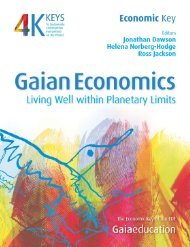Designing Ecological Habitats - Gaia Education
Designing Ecological Habitats - Gaia Education
Designing Ecological Habitats - Gaia Education
You also want an ePaper? Increase the reach of your titles
YUMPU automatically turns print PDFs into web optimized ePapers that Google loves.
6 <strong>Designing</strong> ecological <strong>Habitats</strong><br />
One of the 13 large<br />
strategically placed<br />
ponds at Crystal<br />
Waters. Each pond<br />
is an element with<br />
many functions.<br />
Many people in the permaculture, ecovillage, urban ecology, new<br />
economics, peace and similar movements fail to grasp this need for simplicity.<br />
Many of the lifestyles in settlements which have otherwise excellent designs<br />
are much too affluent, in my opinion.<br />
The key is to focus on ‘need’. What is sufficient for comfort, health and<br />
hygiene, and a high quality of life? The difference between wants and<br />
needs can be enormous. Focusing on what is sufficient does not necessarily<br />
jeopardise the pursuit of social wealth, rich life experience, or personal and<br />
spiritual wealth. Indeed, excess accumulation of goods could be a hindrance<br />
to health and happiness.<br />
The Need for a New Economy<br />
A long-term sustainable economy must have a ‘zero-growth’ policy. Current<br />
levels of output are already unsustainable – compounding growth will<br />
only make matters worse. Consumer society has this manic obsession with<br />
economic growth, an obsession with obtaining and possessing more goods<br />
that we don’t really need.<br />
Consider the multiples of present levels of production and consumption<br />
that further growth implies. If the world averages only 3% per annum<br />
growth, then by 2060 total world output will be 8 times what it is today.<br />
But our recent history shows that 3% is not enough to make our economy<br />
‘healthy’.<br />
Do you realise that if we had 4% growth, if world population rises to<br />
the expected 9 billion, and if all those people were to come up to the ‘living<br />
standards’ of present-day Westerners, total world economic output would<br />
be 180 times what it is today! Yet the present level is unsustainable.<br />
How do you explain the fact that no conventional politician or<br />
economist seems to re cognize any problem with this enthusiastic<br />
commitment to increasing the GNP as the supreme and<br />
sacred goal?<br />
At present, the richest one-fifth of the world’s people is<br />
consuming four-fifths of the world’s resource production. As a<br />
result, billions of people are so seriously deprived of necessities<br />
that one child dies every three seconds; yet we insist on increasing<br />
our rich-world living standards, output and consumption on a<br />
linear trajectory that is rapidly heading for overshoot. Rather<br />
than increasing output in terms of quantity, we should aim at<br />
improving the quality of goods and services. Better tools, high<br />
level care, more efficient use of land – examples exist already.<br />
In the new economy, the cash sector will be rather small.<br />
Home and community based production will be emphasized.<br />
Swapping, gifts, barter, working bees, shramadamas1 , will increase.<br />
Indeed, there is no shortage of examples in the North<br />
and the South presently being practiced right now, at this very<br />
moment – so what are you waiting for?







